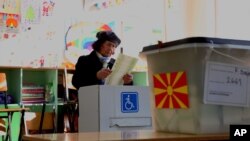Macedonians voted Sunday in a general election called two years early as part of a Western-brokered agreement to end a paralyzing political crisis, and the governing conservatives held a slim lead in early returns.
With 78.4 percent of polling stations reporting, the state electoral commission's website said early Monday that the conservative coalition led by premier Nikola Gruevski's VMRO-DPMNE party had 39.05 percent and the Social Democrat-led coalition of Zoran Zaev was close behind at 36.28 percent.
Supporters of both parties were in the streets claiming victory.
VMRO-DPMNE supporters celebrated in front of the party headquarters in downtown Skopje, the capital.
Addressing his supporters, Gruevski declared victory: “From 88.6 percent of counted votes, we are in the lead with 440,000 votes over the Social Democrats with 415,000 votes. This is the 10th electoral victory for VMRO and the majority of the people gave the vote to our program and vision.”
Activists in the opposition coalition, however, claimed their projections pointed to a victory by their side and gathered in celebration outside party headquarters in Skopje.
An ethnic Albanian party that usually allies with Gruevski, the Democratic Union for Intergration, led by former guerrilla commander Ali Ahmeti, had 7.34 percent of the vote, according to the preliminary results. In an unexpected showing, Besas, a new Albanian party formed in 2014, had 4.47 percent, pushing the Democratic Party of Albanians to third place.
The stakes were reflected in a relatively high turnout for Sunday's election. Two hours before polls closed, voter turnout was 60.38 percent, about 7 points higher than at the same time in the last national election in 2014, said Aleksadnar Chichakovski, head of the State Electoral Commission.
Nearly 1.8 million registered voters were eligible to choose 123 lawmakers for the single-chamber parliament. Three seats are reserved for Macedonians living abroad.
Gruevski, who has headed the government since 2006, sought a new mandate. His leads a 25-party coalition called For a Better Macedonia.
The political crisis began after the opposition accused the conservative government of an illegal wiretapping operation that targeted 20,000 people, including politicians, judges, journalists, police and religious leaders.
Gruevski charged that Zaev was guilty of plotting a coup and creating the political crisis. Zaev accused Gruevski of massive theft, social injustice and corruption.
Over several months, Zaev released audio of dozens of wiretapped phone conversations that he said indicated Gruevski and his aides were involved in multimillion-dollar corruption deals, tampered with election results and brought spurious criminal prosecutions against opponents.
The conservatives vehemently rejected the charges, saying the wiretaps were conducted by unnamed foreign spies.
Gruevski is under investigation by the country's Special Prosecution branch and has already been charged with enticement and carrying out a criminal act against public order.
The scandal led to months of street protests and has been the worst political crisis in Macedonia, which gained independence from the former Yugoslavia in 1991, since the country survived a conflict with its ethnic Albanian minority in 2001.
But voting took place in a “calm and peaceful atmosphere, without irregularities,” said Chichakovski, the electoral chief.
An independent election monitor said there were some cases of people photographing their ballots, which is illegal.
“Electoral boards continue to tolerate photographing the ballot,” said Darko Aleksov, head of the civic association Most, which monitors elections with about 3,000 volunteers.
Police confirmed they detained a man who photographed the ballot at a Skopje polling station and also detained four men for bribery in the eastern town of Kocani.
Nearly 8,000 domestic and about 650 international observers monitored the election.




